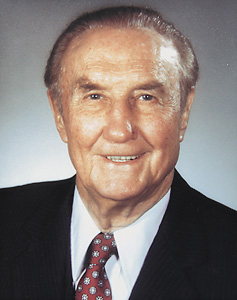Thurmond, Strom (1902-2003), a Republican who represented South Carolina, served in the United States Senate from 1955 to 2003. He served as president pro tempore (temporary president) of the Senate from 1981 to 1987 and from 1995 to 2001.

In the Senate, Thurmond was known for his strong support of states’ rights. He felt that the federal government was taking over many duties and powers that rightfully belonged to state and local governments. At one time, Thurmond also favored racial segregation. But he later modified his views and supported some civil rights legislation.
Thurmond, who began his political career as a Democrat, switched to the Republican Party in 1964. But in 1948, he had briefly dropped out of the Democratic Party to run for president as the candidate of the States’ Rights Democratic (Dixiecrat) Party. The Dixiecrat Party was made up of Southern Democrats who opposed a strong civil rights program (see Dixiecrat Party ). In the 1948 election, Thurmond carried four Southern states—Alabama, Louisiana, Mississippi, and South Carolina—and received 39 electoral votes.
In 1957, Thurmond launched the longest filibuster (delaying speech) in Senate history. He spoke for 24 hours and 18 minutes in an unsuccessful attempt to stop the passage of civil rights legislation.
James Strom Thurmond was born on Dec. 5, 1902, in Edgefield, South Carolina. He graduated from Clemson College. He was governor of South Carolina from 1947 to 1951.
Thurmond was first elected to the Senate in 1954 and took office in 1955. On March 8, 1996—when he reached the age of 93 years and 94 days—he became the oldest person ever to serve in Congress.
In 2002, Thurmond announced that he would not seek reelection in 2002. He retired when his eighth term ended in January 2003. At that time, he was 100 years old and had been a senator for 47 years. Thurmond died on June 26, 2003.
